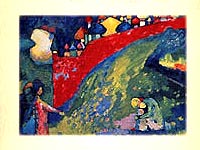Discernment Exercise: Measuring Spirituality

Given the wide-spread interest in spirituality today, it probably isn’t surprising that a psychologist has proposed a way to gauge “spiritual intelligence.” Robert Emmons teaches at the University of California (Davis), and suggests five characteristics for measuring how a person’s spirituality actually affects their life, or as he puts it, how their spirituality facilitates “everyday problem-solving and goal attainment.” In other words, Emmons’ five points gauge to what extent a person’s spirituality—assumed to be an unseen, unmeasurable quality of life—is lived out in practical ways that can be observed and measured.
Here is Dr. Emmons’ list:
1. The capacity for transcendence. Highly spiritual persons perceive a reality that transcends the material and physical.
2. The ability to sanctify everyday experience. Spiritually intelligent persons have an ability to invest everyday activities, events, and relationships with a sense of the sacred or divine. They consider its implications for their understanding of self, others, nature, and life. For the spiritually intelligent person, work is seen as a calling, parenting as a sacred responsibility, marriage as having spiritual significance. I write this chapter in St. Andrews, Scotland, a short walk from the opening scene of Chariots of Fire. The film portrays Eric Liddell’s reflection on the spiritual significance of running: ‘When I run, I feel His pleasure.’
3. The ability to experience heightened states of consciousness. While engaged in meditation and certain forms of mystical prayer, spiritually intelligent persons experience spiritual ecstasy. They are receptive to mystical experience.
4. The ability to utilize spiritual resources to solve problems. Spiritual transformations often lead people to re-prioritize goals. If spiritual intelligence is indeed a form of intelligence, it will also lead people to cope more effectively with problems and to lead more effective lives, with higher levels of well-being.
5. The capacity to engage in virtuous behavior. Spiritually intelligent people have an enhanced ability to show forgiveness, express gratitude, feel humility, display compassion.
Given the fact that spirituality is often a topic of conversation with those who may or may not share our deepest convictions and values, Dr. Emmons’ list is an opportunity to engage in some thoughtful discernment.
Questions
1. Do you consider yourself a spiritual person? What would you point to in your life for evidence this is true? What difference does your spirituality make in your life?2. Do you believe a person’s spirituality should facilitate everyday problem-solving and goal attainment? Why or why not?
3. What texts of Scripture suggest a practical link between one’s spiritual life and the details of ordinary, everyday life? How does the Scriptural teaching align with Emmons’ list?
4. Apply Dr. Emmons’ list of five signs to yourself—how do you rate? Which of the five are especially evident in your life? Which are most conspicuously absent or lacking?
5. What do you agree with in Dr. Emmons’ list? What would you challenge? Why? Is there anything you would subtract from the list? Add to the list? Why?
6. Reflect on the difference between seeing life in terms of “pilgrimage” versus seeing it in terms of “progress.” Both imply motion, but progress brings with it a sense of achievement which may not always be evident as a pilgrimage unfolds. Slogging through an endless circle of hard times, for example, may be essential, even central to one’s pilgrimage but it may reveal precious little progress, especially if the difficulties seem pointless and achieve nothing that we can measure or sense. Which of the two—pilgrimage or progress—seems most closely related to your notion of spirituality? Why?
7. How do you define spirituality? Why? Does your definition include the “spiritual yearning” or “spiritual experience” of those who do not share your faith? Why or why not? If it does not, how would you define their spirituality? How would you communicate this to them? Is spirituality a continuum for all human beings, regardless of their particular beliefs, behaviors and values? If not, why not?
8. Although I have no data for this, my sense is that for many people today the yearning for some growth in or experience of spirituality is of great importance to them. What evidence do you see of this? If you had to choose between growing spiritually and expanding your mind, which would you choose? Between growing spirituality and increasing your health and fitness? What do you do to grow spiritually? What do you do to expand your mind? What do you do to remain fit? Which, practically, has the greater priority in how you plan and use your time and energy?
9. “The spiritual,” Thomas Carlyle (1795-1881) wrote, “is the parent of the practical.” Do you agree? Why or why not?
10. “The spiritual life,” Henri Nouwen (1932-1996) wrote, “does not remove us from the world but leads us deeper into it.” Do you agree? Why or why not?
Source
Dr. Emmons’ five-fold list appeared in “Looking at spiritual IQ” in Context: Martin Marty on Religion & Culture (April 15, 2003; Volume 35, Number 8) pp. 4-5.Christ Plays in Ten Thousand Places: A Conversation in Spiritual Theology by Eugene H Peterson (Grand Rapids, MI: Eerdmans; 2005) 338 pp.

